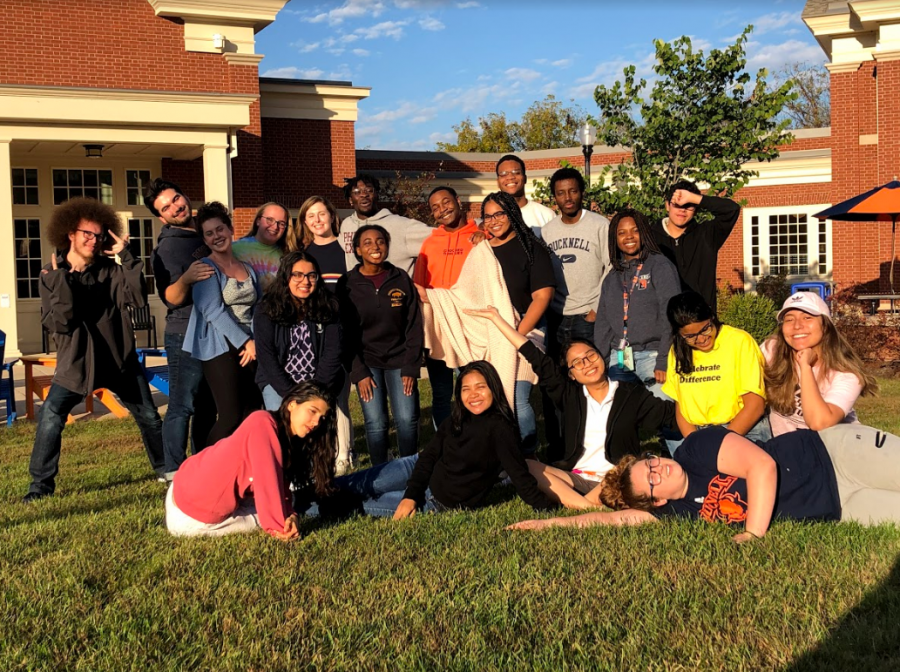Standing on Common Ground
October 25, 2019
Many students, both prospective and current, wonder what diversity means at the University. They also wonder how diversity — whether racial, intellectual, political, sexual, etc. — can be further accepted and expressed on campus. Common Ground was created to address these issues.
What is Common Ground?
This student-led retreat, which typically takes place over Fall Break at the Forrest D. Brown Conference Center at Cowan, explores topics including race, ethnicity, sexual orientation, and gender specifically inside and outside of the University environment. This year, the retreat was held with sessions on campus.
Common Ground aims to: raise student awareness of societal and global biases and inequity structures; teach students to understand this personal connection and encourage academic inquiry about diversity, democracy, and globalization; train students to become equity change agents in their settings; improve the campus climate to help retain and attract underrepresented students and faculty; and foster a learning environment for all.
Common Ground facilitator Julian Ricketson ’21 said this diversity immersion retreat was “created for students by students.” While the retreat’s focus this year was on how personal identities are relevant to everyday lives at the University, the facilitators annually lead deeper discussions into topics surrounding ethnicity, race, gender, sexuality, socio-economic status, ability status, and religion during the retreat.
“Conversation about real social issues are difficult to have on Bucknell’s campus, so it is easy to get stuck in the ‘Bucknell bubble,’” Ricketson said. “Common Ground is a first step toward popping that bubble and changing the way we talk to one another on campus.”
How did Common Ground begin?
Eleven years ago, Common Ground was created when a group of passionate University students decided they needed a vehicle to combat the social issues they observed on campus. This student-group eventually formed into Common Ground as we know it today. The retreat format of Common Ground was modeled off of one of Duke University’s social retreats at the time. The students saw the intimate retreat environment as being the most beneficial for facilitating group discussions about social issues and identities. Since then, Common Ground has become a popular program, and is a Fall Break staple each year.
What are the benefits of talking about these topics?
In focusing on the base concepts of race, ethnicity, gender, sexuality, social and ability status and religion, Common Ground’s facilitators are able to allow participating students to jump off of these topics and guide their own discussions.
“We provide folks with programming and they really dictate the direction the conversation goes,” Ricketson said. “We feel it is important to at least touch on as many identities as possible in order to provide [students] with an opportunity to recognize their space and existence on campus, where they normally might not. Recognition goes a long way when the alternative is silence and erasure.”
What role does Common Ground play?
“From my own perspective, it seems as if identity (no matter what form) has become an extremely politicized topic that people often times would rather shy away from. Common Ground seeks to mitigate this by simply providing that space of recognition and facilitating engagement through activities in hopes of making the process of talking far less of a ‘scary’ thing,” Ricketson said.
Over the past two years, Ricketson said the Common Ground facilitators have done a lot of work to redevelop the retreat’s curriculum so that the program continually honors its mission and adapts to changing social issues. Because “diversity is far more than just a quota to fill . . . [it] is life, and life is diverse,” Ricketson said. “It’s time to start engaging in constructive conversations surrounding the various identities that exist within the world today and to stop seeking to erase them, because that is simply the reality of the world we live in. Our campus is no different, and we’ve certainly got a long way to go.”
What are other ways to spread awareness? How can students help?
In addition to signing up for the Common Ground retreat, students interested in spreading awareness and discussion of identity and related topics should engage in their own conversations across campus. All students should use their privileges for good, regardless of how they identify.
“That means speaking out against those who seek to harm, practicing good allyship, and most importantly, accepting the existence of privileges within our lives,” Ricketson said. “Silence simply allows the problem to continue and that’s really not constructive for anybody. We need to talk, engage with each other, and educate those who need to be educated. Don’t be afraid to talk, you might learn something.”
Do you have a favorite Common Ground activity?
Ricketson said his favorite Common Ground activity is one he and another facilitator created. It is called PCPC (Politically Correct Pop–Culture) and is an activity “where we take songs you would normally hear on the radio or within your favorite movie and simply ask groups to rewrite the song to be more socially accepting and inclusive, less provocative, as well as design some sort of performance to compete against other groups.”
Ricketson said that it’s not only fun, but also meaningful. “You start to quickly realize we let a lot slide in the name of art, especially if it’s catchy. It’s a really interesting activity for sure,” Ricketson said.





















